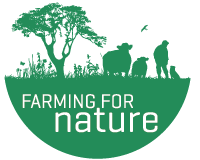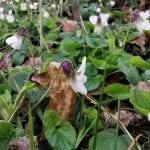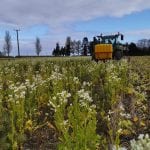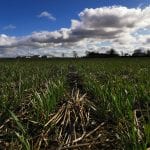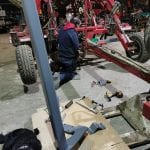Andrew Bergin
Andrew Bergin farms 320 acres of tillage. He has been practicing no-till cereals for a good number of years, while managing the soil in a way to promote high levels of biological benefits. Andrew sows cover crops, and is constantly trailing on farm what species work best for his soil and rotation. This is an integral part that has allowed Andrew prosper in this system that benefit both the environment and the farmer. His approach is to improve the soil structure and the microflora and insect populations in the soil. Crops include spring and winter cereals, oil seed rape and peas. Integrated crop management is practiced to minimise the use of sprays – no insecticides have been used in the last 5 years. Pollinator strips, 6 – 10 meters wide are in place around most of the tillage fields margins, attracting large numbers of insects and birds. In addition, a number of fields margins and other areas, which were difficult to cultivate for tillage crops, have been planted with trees – oak, beech, birch, holly, hazel, pheasant berry etc. Some of these have been in place for over 10 years and provide excellent cover for birds. In one area the pyramid orchid has established and is flourishing. Hedgerow are diverse and managed to encourage nature. Andrew’s farm is moving away from excessive inputs and looking bring new ideas and knowledge as well as a positive focus to a type of farming generally considered less environmentally friendly. “It is important to get involved in and look at local research so we can each discover what is best for our own soils, not what chemical is best to throw on it.”
NOMINATION DESCRIPTION:
Nomination 1:
Andrew and Antoinette farm 130 ha of crops in co. Kildare. Barley, oats, wheat, peas, beans and oilseed rape. The focus of the farm is on soil health with no-till sowing cover crops and reduced use of pesticides and chemical fertilisers and the introduction of animal manures.
There are lots of wide grass margins around the tillage fields, that are allowed to flower and provide rough grass areas for insects and wildlife. There are tree plantations, and hedge cutting has been greatly reduced allowing the hedges to grow up and flower. Awkward field corners have been either strategically planted with hardwoods or left wild. He pays great attention to the river that runs along his boundary.
Andrew is taking a growing interest in the biodiversity on the farm, ranging from the snipe in the cover crops over the winter, to monitoring the bumblebees and butterflies for the National Biodiversity Data Centre.
Andrew is an active member of BASE Ireland. He is a participant in DANU EIP project studying conversion to biological farming. He is also a participant and sits on the steering group of the Protecting Farmland Pollinators EIP.
This is what Andrew wrote himself : I have been farming for 30 years but my ecological epiphany is fairly recent. A direct drilling trial 7 years ago confirmed my feeling that soil disturbance was a self-sustaining mistake, ie the more of this foolish thing you do the more of it you need to do. The changes I noticed in soil behaviour had me searching for answers and joining BASE Ireland, a group focused on biological farming, started to answer them while posing lots more.
I have been lucky enough to do David Wallace’s "Soils Course" twice, as well as three courses with Hugh Lovel and numerous others including Glen Atkinson and Graeme Sait. I have also attended numerous NOTS course and field walks and hosted a farm visit last year.
The Danu EIP project addresses the crucial issue of the conversion of a farm from conventional to biological production. The risks and uncertainties of this conversion are limiting the expansion of biological farming and I am convinced that by providing a roadmap, backed by solid scientific evidence, we can help many more farms to move in this direction. We can also provide a robust defence to sceptics who feel threatened by these developments.
The Farmland Pollinator Project aims to provide simple, low cost improvements to farm practices that will benefit pollinators. This approach is very careful not tothreaten farmers livelihoods but to involve them in the process. I firmly believe that this will influence and inspire farmers far more than conventional, doctrinaire schemes.
I am a founder member of the Athy Tillage Discussion Group where I have been patiently subverting the orthodox practices of my neighbours. I am a committee member and former chairman of Groups Together, the umbrella body for discussion groups.
I am a member of Athy IFA and am a former chairman of the National Pea and Bean Commitee and a former member of the National Grain Committee.
I was involved for many years in a machinery sharing arrangement with 3 neighbouring farms. In 1999 I was awarded a Teagasc / Farming Independent Travel Bursary to study international models for machinery sharing.
I am honoured to be proposed for this award. The list of nominees already includes people who I feel are far more advanced in their farming for nature than I am. But I believe that my relatively recent move in this direction might give me a useful channel to communicate to more conventional farmers. Many of my farm practices are not as green as I want them to be but a work in progress may be more instructive and less challenging to other newcomers to this approach.
Nominators: Kim and Mirielle McCall, FFN Ambassadors 2019
Nomination 2:
Andrew Bergin is BASE Irelands nomination from it cereals members. Andrew has been practicing no-till cereals for a good number of years, while managing the soil in a way to promote high levels of biological benefits. Andrew from the beginning was sowing cover crops, and is constantly trialing on farm what species work best for his soil and rotation. This is an integral part that has allowed Andrew prosper in this system that benefit both the environment and the farmer. I have attached a little video in which Andrew is showcasing his farm for another part of his business. https://www.youtube.com/watch?v=mfejxVt4_Jg
Nominator: Michael Costello, Secretary, BASE Ireland
